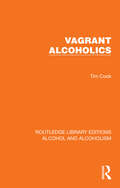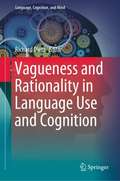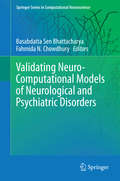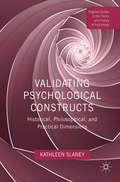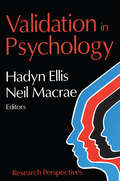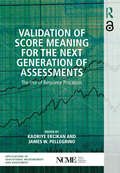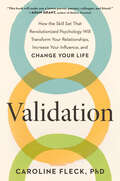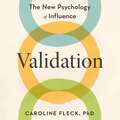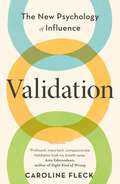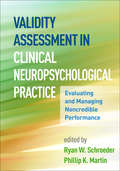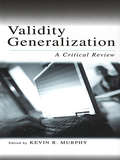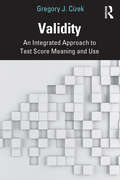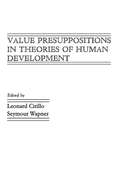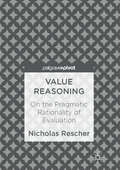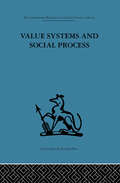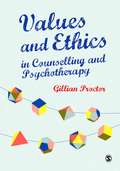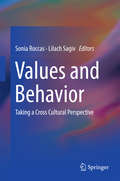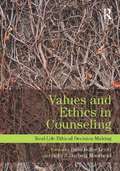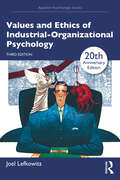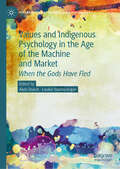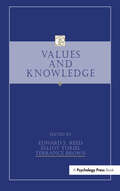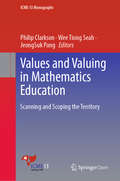- Table View
- List View
Vagrant Alcoholics (Routledge Library Editions: Alcohol and Alcoholism)
by Tim CookIn the 1970s the vagrant alcoholic was not a new problem, and for the previous two hundred years people had asked: What can be done to help them? Why not lock them up? Why don’t they get jobs? Tim Cook had worked for many years with homeless men and in this book, originally published in 1975, he describes the problems of vagrant alcoholics and the way in which one voluntary organization, the Alcoholics Recovery Project, based in South London, responded to these problems. The response had in essence been one of experimentation beginning with the first hostel in 1966, the development of non-residential shop fronts in 1970, and the employment of a team of recovered alcoholics in 1974. The Project sought to break down the mistrust surrounding the problem on all sides and to rediscover the potential of the so-called ‘hopeless’ skid row alcoholic. Tim Cook places the Project’s work in the wider context of social work and social responsibility, and shows that its methods had relevance for other agencies. He also examines the persistent failure of successive governments to take any positive action to tackle the problems of vagrant alcoholics. Throughout the book the views of the alcoholics themselves are integrated with the attitudes and experiences of the Project workers. The author offers an assessment of the Project’s work, and an outline of its limitations, stressing that no easy answer exists to this problem. But, he believed, the Project had made valuable progress towards a greater understanding of the vagrant alcoholic and his milieu.
Vagueness and Rationality in Language Use and Cognition (Language, Cognition, and Mind #5)
by Richard DietzThis volume presents new conceptual and experimental studies which investigate the connection between vagueness and rationality from various systematic directions, such as philosophy, linguistics, cognitive psychology, computing science, and economics. Vagueness in language use and cognition has traditionally been interpreted in epistemic or semantic terms. The standard view of vagueness specifically suggests that considerations of agency or rationality, broadly conceived, can be left out of the equation. Most recently, new literature on vagueness has been released which suggests that the standard view is inadequate and that considerations of rationality should factor into more comprehensive models of vagueness. The methodological approaches presented here are diverse, ranging from philosophical interpretations of rational credence for vagueness to adaptations of choice theory (dynamic choice theory, revealed preference models, social choice theory), probabilistic models of pragmatic reasoning (Bayesian pragmatics), evolutionary game theory, and conceptual space models of categorisation.
Validating Neuro-Computational Models of Neurological and Psychiatric Disorders
by Basabdatta Sen Bhattacharya Fahmida N. ChowdhuryThis book is a collection of articles by leading researchers working at the cutting edge of neuro-computational modelling of neurological and psychiatric disorders. Each article contains model validation techniques used in the context of the specific problem being studied. Validation is essential for neuro-inspired computational models to become useful tools in the understanding and treatment of disease conditions. Currently, the immense diversity in neuro-computational modelling approaches for investigating brain diseases has created the need for a structured and coordinated approach to benchmark and standardise validation methods and techniques in this field of research. This book serves as a step towards a systematic approach to validation of neuro-computational models used for studying brain diseases and should be useful for all neuro-computational modellers.
Validating Psychological Constructs
by Kathleen SlaneyThis book critically examines the historical and philosophical foundations of construct validity theory (CVT), and how these have and continue to inform and constrain the conceptualization of validity and its application in research. CVT has had an immense impact on how researchers in the behavioural sciences conceptualize and approach their subject matter. Yet, there is equivocation regarding the foundations of the CVT framework as well as ambiguities concerning the nature of the "constructs" that are its raison d'etre. The book is organized in terms of three major parts that speak, respectively, to the historical, philosophical, and pragmatic dimensions of CVT. The primary objective is to provide researchers and students with a critical lens through which a deeper understanding may be gained of both the utility and limitations of CVT and the validation practices to which it has given rise.
Validation in Psychology: Research Perspectives
by Hadyn Ellis Neil MacraeWhy do we respond to others-both to their physical appearances and to their personalities? What are the social influences on face perception? Current research perspectives on physical appearance by distinguished behavioral scientists from around the world were brought together in a special issue of Current Psychology and are offered here in a useful compendium.Chapters and contributors include: "Assessing the State of Organizational Safety-Culture or Climate?" Kathryn J. Mearns and Rhona Flin; "Why Did It Happen to Me? Social Cognition Processes in Adjustment and Recovery from Criminal Victimization and Illness" by Malcolm D. MacLeod; "What's in a Name, What's in a Place? The Role of Verbal Labels in Distinct Cognitive Tasks" by J.B. Deegowski, D.M. Parker, and P. George; "On Disregarding Deviants: Exemplar Typicality and Person Perception" by C. Neil Macrae, Galen V. Bodenhausen, Alan B. Milne, and Luigi Castelli; "Mood in Chronic Disease: Questioning the Answers" by Marie Johnston; "The Emotional Impact of Faces (but not Names): Face Specific Changes in Skin Conductance Responses to Familiar and Unfamiliar People" by Hadyn D. Ellis, Angela H. Quayle, and Andrew W. Young; "Average Faces are Average Faces" by Jim Pollard, John Shepard, and Jean Shepard; "Computer Graphic Studies of the Role of Facial Similarity in Judgments of Attractiveness" by I.S. Penton-Voak, D.I. Perrett, and J.W. Peirce; "One Extreme or the Other, or Perhaps the Golden Mean? Issues of Spatial Resolution in Face Processing" by Dennis M. Parker and Nicholas P. Costen; "The Impact of Character Attribution on Composite Production: A Real World Effect?" by Graham Davies and Heidi Oldman; "Repetition Priming of Face Gender Judgments: An Instance Based Explanation" by Dennis C. Hay.Validation in Psychology will benefit students, researchers, and practitioners of psychology, criminology, sociology, and experts in organizational behavior who are concerned with the impact of physical appearance on health psychology, crime, organizational safety, and above all, person perception.
Validation of Score Meaning for the Next Generation of Assessments: The Use of Response Processes
by James W. Pellegrino Kadriye ErcikanDespite developments in research and practice on using examinee response process data in assessment design, the use of such data in test validation is rare. Validation of Score Meaning in the Next Generation of Assessments Using Response Processes highlights the importance of validity evidence based on response processes and provides guidance to measurement researchers and practitioners in creating and using such evidence as a regular part of the assessment validation process. Response processes refer to approaches and behaviors of examinees when they interpret assessment situations and formulate and generate solutions as revealed through verbalizations, eye movements, response times, or computer clicks. Such response process data can provide information about the extent to which items and tasks engage examinees in the intended ways. With contributions from the top researchers in the field of assessment, this volume includes chapters that focus on methodological issues and on applications across multiple contexts of assessment interpretation and use. In Part I of this book, contributors discuss the framing of validity as an evidence-based argument for the interpretation of the meaning of test scores, the specifics of different methods of response process data collection and analysis, and the use of response process data relative to issues of validation as highlighted in the joint standards on testing. In Part II, chapter authors offer examples that illustrate the use of response process data in assessment validation. These cases are provided specifically to address issues related to the analysis and interpretation of performance on assessments of complex cognition, assessments designed to inform classroom learning and instruction, and assessments intended for students with varying cultural and linguistic backgrounds. The Open Access version of this book, available at http://www.taylorfrancis.com, has been made available under a Creative Commons Attribution-Non Commercial-No Derivatives 4.0 license.
Validation: How the Skill Set That Revolutionized Psychology Will Transform Your Relationships, Increase Your Influence, and Change Your Life
by Caroline Fleck PhD"Warning: this book will make you a better parent, partner, colleague, and friend." —Adam Grant, New York Times bestselling author of Hidden Potential Unlock the secret to true and lasting change.We all spend a lot of energy trying to get people to listen to us, and despite our best efforts, we often fail. But what if the secret to influencing others was to demonstrate acceptance?Enter validation—communication where one accepts and sees the validity in another person&’s experience. Research on validation shows that it has profound effects, from improving relationships and de-escalating conflicts to increasing one&’s influence and self-compassion. In this groundbreaking book, clinical psychologist Caroline Fleck explores how validation&’s unique ability to demonstrate acceptance while fostering change makes it one of psychotherapy&’s best-kept secrets. More importantly, she takes us step-by-step through eight skills we can use to communicate validation and experience its power firsthand. Full of captivating stories, laugh-out-loud moments, and actionable takeaways, Validation reveals how the science of seeing and being seen is the key to inner and interpersonal transformation.
Validation: The New Psychology of Influence
by Caroline FleckUnlock the secret to true and lasting change'A crash course in the most important skills for forging connection and fuelling change.' ADAM GRANT'Profound, important, compassionate, Validation took my breath away.' AMY EDMONDSONWe all spend a huge amount of time trying to get people to listen to us, and despite our best efforts, we often fail. But what if the secret to influencing others was in first accepting them?This is known as validation: the act of showing someone that you understand their experience and accept it as valid.As both a means and an end, validation skills are proven to impact five key areas of our life: enhancing our relationships, de-escalating conflict, increasing our ability to drive behaviour change, influencing growth in others, and developing a stronger connection to self. In this groundbreaking book, Stanford University psychologist Caroline Fleck explains why validation is a catalyst for transformation, and shares her step-by-step framework to put this powerful skillset into practice.
Validation: The New Psychology of Influence
by Caroline FleckUnlock the secret to true and lasting change'A crash course in the most important skills for forging connection and fuelling change.' ADAM GRANT'Profound, important, compassionate, Validation took my breath away.' AMY EDMONDSONWe all spend a huge amount of time trying to get people to listen to us, and despite our best efforts, we often fail. But what if the secret to influencing others was in first accepting them?This is known as validation: the act of showing someone that you understand their experience and accept it as valid.As both a means and an end, validation skills are proven to impact five key areas of our life: enhancing our relationships, de-escalating conflict, increasing our ability to drive behaviour change, influencing growth in others, and developing a stronger connection to self. In this groundbreaking book, Stanford University psychologist Caroline Fleck explains why validation is a catalyst for transformation, and shares her step-by-step framework to put this powerful skillset into practice.
Validity Assessment in Clinical Neuropsychological Practice: Evaluating and Managing Noncredible Performance (Evidence-Based Practice in Neuropsychology)
by Ryan W. Schroeder and Phillip K. MartinPractical and comprehensive, this is the first book to focus on noncredible performance in clinical contexts. Experts in the field discuss the varied causes of invalidity, describe how to efficiently incorporate validity tests into clinical evaluations, and provide direction on how to proceed when noncredible responding is detected. Thoughtful, ethical guidance is given for offering patient feedback and writing effective reports. Population-specific chapters cover validity assessment with military personnel; children; and individuals with dementia, psychiatric disorders, mild traumatic brain injury, academic disability, and other concerns. The concluding chapter describes how to appropriately engage in legal proceedings if a clinical case becomes forensic. Case examples and sample reports enhance the book's utility.
Validity Generalization: A Critical Review (Applied Psychology Series)
by Kevin R. MurphyThis volume presents the first wide-ranging critical review of validity generalization (VG)--a method that has dominated the field since the publication of Schmidt and Hunter's (1977) paper "Development of a General Solution to the Problem of Validity Generalization." This paper and the work that followed had a profound impact on the science and practice of applied psychology. The research suggests that fundamental relationships among tests and criteria, and the constructs they represent are simpler and more regular than they appear. Looking at the history of the VG model and its impact on personnel psychology, top scholars and leading researchers of the field review the accomplishments of the model, as well as the continuing controversies. Several chapters significantly extend the maximum likelihood estimation with existing models for meta analysis and VG. Reviewing 25 years of progress in the field, this volume shows how the model can be extended and applied to new problems and domains. This book will be important to researchers and graduate students in the areas of industrial organizational psychology and statistics.
Validity: An Integrated Approach to Test Score Meaning and Use
by Gregory J. CizekValidity is a clear, substantive introduction to the two most fundamental aspects of defensible testing practice: understanding test score meaning and justifying test score use. Driven by evidence-based and consensus-grounded measurement theory, principles, and terminology, this book addresses the most common questions of applied validation, the quality of test information, and the usefulness of test results. Concise yet comprehensive, this volume’s integrated framework is ideal for graduate courses on assessment, testing, psychometrics, and research methods as well as for credentialing organizations, licensure and certification entities, education agencies, and test publishers.
Vallen en opstaan in de adolescentie: een overzicht van de ontwikkeling van 12 tot 25 jaar
by Wim MeeusDit boek biedt professionals, studenten en andere geïnteresseerden een uniek overzicht van onderzoek naar de ontwikkeling van jonge mensen van 12 tot 25 jaar.
Value Presuppositions in Theories of Human Development
by Leonard Cirillo, Seymour WapnerFirst published in 1986. Routledge is an imprint of Taylor & Francis, an informa company.
Value Reasoning
by Nicholas RescherThis book is a survey of key issues in the theory of evaluation aimed at exhibiting and clarifying the rational nature of the thought-procedures involved. By means of theoretical analysis and explanatory case studies, this volume shows how evaluation is--or should be--a rational procedure directed at appropriate objectives. Above all, it maintains the objectivity of rational evaluation.
Value Systems and Social Process (Pelican Ser.)
by Geoffrey VickersTavistock Press was established as a co-operative venture between the Tavistock Institute and Routledge & Kegan Paul (RKP) in the 1950s to produce a series of major contributions across the social sciences. This volume is part of a 2001 reissue of a selection of those important works which have since gone out of print, or are difficult to locate. Published by Routledge, 112 volumes in total are being brought together under the name The International Behavioural and Social Sciences Library: Classics from the Tavistock Press. Reproduced here in facsimile, this volume was originally published in 1968 and is available individually. The collection is also available in a number of themed mini-sets of between 5 and 13 volumes, or as a complete collection.
Values & Ethics in Counselling and Psychotherapy
by Gillian M ProctorThis book offers an introduction to values and ethics in counselling and psychotherapy, helping you to develop the ethical awareness needed throughout the counselling process. The book covers: - Context and emergence of ethics in counselling - Exercises to explore personal and professional values - Tools to develop ethical mindfulness - Differences between therapeutic models - Relational ethics - Ethical dilemmas and issues - Practice issues including confidentiality, boundaries and autonomy versus beneficence. Using in-depth case studies of counselling students, the author demonstrates the constant relevance of values and ethics to counselling and psychotherapy, equipping trainees with the tools to successfully navigate values and ethics in their professional practice.
Values Pedagogy and Student Achievement
by Terence Lovat Kerry Dally Neville Clement Ron ToomeyUnder the weight of a combination of forces, many of the older paradigms of learning are being questioned in our time. Among the updated research that elicits such critique is that which deals directly with effective pedagogy, clearly illustrating the enhanced effects on learning when it is dealt with as a holistic developmental enterprise rather than one concerned solely with content, technique and measurable outcomes. This research includes volumes of empirical evidence and conceptual analysis from across the globe that point to the inextricability of values as lying at the heart of those forms of good practice pedagogy that support and facilitate the species of student achievement that truly does transform the life chances of students. This research indicates that the combination of values rich learning environments and values discourse (that is, the holism of implicit and explicit pedagogy) has potential for positive influence on learning outcomes, most markedly for those deemed likely to fail without such pedagogical intervention. Values Pedagogy and Student Achievement - Contemporary Research Evidence uncovers, explores and appraises those volumes of evidence and analysis, illustrating their pertinence to student achievement, the vexed issue that lies at the heart of all for which education stands.
Values and Behavior
by Sonia Roccas Lilach SagivWhat are values? How are they different from attitudes, traits, and specific goals? How do our values influence our behavior, and vice versa? How does our culture and environment impact the relationship between values and behavior? These questions and more are rigorously examined by prominent and emerging scholars in this significant volume Values and Behavior: Taking A Cross Cultural Perspective. Personal values are cognitive representations of abstract, desirable motivational goals that guide the way individuals select actions, evaluate people and events, and explain their actions and evaluations. The unique features of values have implications for their impact on behavior. People are highly satisfied with their values and perceive them as close to their ideal selves. At the same time, however, daily interpersonal interaction reveals that individuals hold different, sometimes opposing, value profiles. These individual differences are even more apparent when individuals from different cultures interact. The collected chapters address the links between values and behavior from a cultural perspective. They review studies conducted in various cultures and discuss culture as a moderator of the relationships between values and behavior. Structurally, part I of the volume discusses what values are and how they should be measure; part II then examines the contents of the relationships between values and behavior in different life-domains, including prosocial behavior, aggression, behavior in organizations and relationships formation. Part III explores some of the moderating mechanisms that relate values to behavior. Taken together, these chapters review and synthesize over twenty years of research on values and behavior, and propose new insights that have important implications for both research and for practice.
Values and Ethics in Counseling: Real-Life Ethical Decision Making
by Dana Heller Levitt Holly J. Hartwig MoorheadMany counselors learn about ethics in graduate school by applying formal, step-by-step ethical decision-making models that require counselors to be aware of their values and refrain from imposing personal values that might harm clients. However, in the real world, counselors often make split-second ethical decisions based upon personal values. Values and Ethics in Counseling illustrates the ways in which ethical decisions are values—but more than that, it guides counselors through the process of examining their own values and analyzing how these values impact ethical decision making. Each chapter presents ethical decision making as what it is: a very personal, values-laden process, one that is most effectively illustrated through the real-life stories of counselors at various stages of professional development—from interns to seasoned clinicians—who made value-based decisions. Each story is followed by commentary from the author as well as analysis from the editors to contextualize the material and encourage reflection.
Values and Ethics of Industrial-Organizational Psychology (Applied Psychology Series)
by Joel LefkowitzThis foundational text was one of the first books to integrate work from moral philosophy, developmental/moral psychology, applied psychology, political and social economy, and political science, as well as business scholarship. Twenty years on, this third edition utilizes ideas from the first two to provide readers with a practical model for ethical decision making and includes examples from I-O research and practice, as well as current business events. The book incorporates diverse perspectives into a "framework for taking moral action" based on learning points from each chapter. Examples and references have been updated throughout, and sections on moral psychology, economic justice, the "replicability crisis," and open science have been expanded and the "radical behavioral challenge" to ethical decision-making is critiqued. In fifteen clearly structured and theory-based chapters, the author also presents a variety of ethical incidents reported by practicing I-O psychologists. This is the ideal resource for Ethics and I-O courses at the graduate and doctoral level. Academics in Organizational Behavior and Human Resource Management will also benefit from this book, as well as anyone interested in Ethics in Psychology and Business.
Values and Ethics of Industrial-Organizational Psychology (Applied Psychology Series)
by Joel LefkowitzThis foundational text was one of the first books to integrate work from moral philosophy, developmental/moral psychology, applied psychology, political and social economy, and political science, as well as business scholarship. Twenty years on, this third edition utilizes ideas from the first two to provide readers with a practical model for ethical decision making and includes examples from I-O research and practice, as well as current business events. The book incorporates diverse perspectives into a "framework for taking moral action" based on learning points from each chapter. Examples and references have been updated throughout, and sections on moral psychology, economic justice, the "replicability crisis," and open science have been expanded and the "radical behavioral challenge" to ethical decision-making is critiqued. In fifteen clearly structured and theory-based chapters, the author also presents a variety of ethical incidents reported by practicing I-O psychologists.This is the ideal resource for Ethics and I-O courses at the graduate and doctoral level. Academics in Organizational Behavior and Human Resource Management will also benefit from this book, as well as anyone interested in Ethics in Psychology and Business.
Values and Indigenous Psychology in the Age of the Machine and Market: When the Gods Have Fled (Palgrave Studies in Indigenous Psychology)
by Louise Sundararajan Alvin DueckThis interdisciplinary edited collection addresses issues at the intersection of indigenous psychology, market ideology, values, and technology. The aims of this book arise from the recognition that whereas the unfolding of the agricultural revolution over thousands of years allowed for the gradual co-evolution of values and technology to blossom, the post-industrial technological revolution is so accelerated that there has been little time for the co-evolution of values. To address this, the chapters collected here seek to initiate a conversation that will provide the conceptual space for the evolution of values that can keep pace with contemporary developments in the machine and the market. In this conversation, they argue, indigenous psychologies will necessarily play a central role for two reasons: firstly, as alternative systems of thought they enable a productive interrogation of the rationality of machine and the market; and second, examples of the impact of technology and the market on traditional societies hold lessons for potential future impacts on the society as a whole. This timely work offers fresh insights that will appeal to students and scholars of psychology, cultural and religious studies, anthropology, business and economics, and science and technology studies.
Values and Knowledge (Jean Piaget Symposia Series)
by Elliot Turiel Terrance Brown Edward S. ReedIt is widely recognized that a person's values will profoundly affect what that person attends to, thinks about, and remembers. Yet, despite this, psychologists have only begun to study and think about the deep connections between values and knowledge. This volume explores this important area in psychology by offering an overview of what is known about the developmental role of valuation in the acquisition of knowledge, and also by examining a range of new ideas for understanding the intricate connection between evaluation and thinking. More specifically, the text: provides a historical overview of philosophical and psychological theories relating the values and knowledge; reviews the importance of values for infants and their caretakers in the origins of both cognition and social relations; offers a provocative view of how the differences among families in their values may have profound affects on psychological development; explicates the development of a personal sphere within which one strives to shape one's own values; emphasizes the heterogeneity of valuation inherent in every culture and how conflicts of values are likely to be common and important to human development; presents eye-opening research on social-cognitive limitations of average people in respecting the points of view of others; and summarizes and critiques Piaget's theory of the role of values in development. For practitioners in the fields of developmental and social psychology, and education, this volume will introduce a number of important and current issues, from multiculturality and gender to the differential roles of temperament and upbringing in development. The emphasis is placed squarely on developing individuals and how they shape themselves in a world that is structured by values as well as by facts.
Values and Valuing in Mathematics Education: Scanning and Scoping the Territory (ICME-13 Monographs)
by Philip Clarkson Wee Tiong Seah JeongSuk PangThis engaging open access book discusses how a values and valuing perspective can facilitate a more effective mathematics pedagogical experience, and allows readers to explore multiple applications of the values perspective across different education systems. It also clearly shows that teaching mathematics involves not only reasoning and feelings, but also students’ interactions with their cultural setting and each other.The book brings together the work of world leaders and new thinkers in mathematics educational research to improve the learning and teaching of mathematics. Addressing themes such as discovering hidden cultural values, a multicultural society and methodological issues in the investigation of values in mathematics, it stimulates readers to consider these topics in cross-cultural ways, and offers suggestions for research and classroom practice.It is a valuable resource for scholars of mathematics education, from early childhood through to higher education and an inspiring read for all mathematics teachers.
